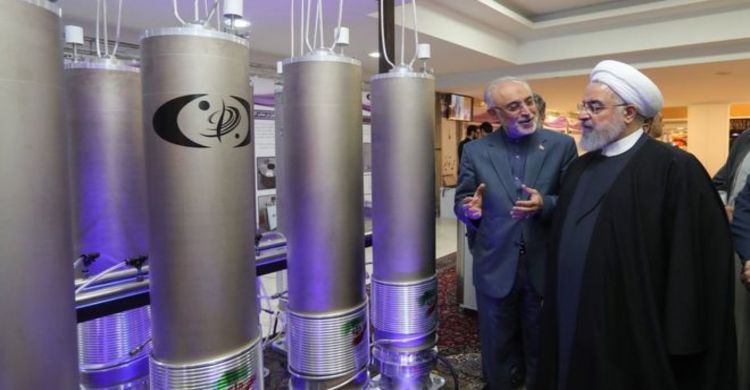European powers put Iran nuclear deal into dispute

European powers have triggered a formal dispute mechanism over Iran's breaches of key parts of the 2015 nuclear deal - a move that could spell its end, reports BBC.
Iran has gradually lifted all limits on its production of enriched uranium, which can be used to make reactor fuel but also nuclear weapons.
It has said it is entitled to do so in response to sanctions reinstated by the US when it abandoned the deal in 2018.
France, Germany and the UK said they did not accept Iran's argument.
They said they were acting "in good faith with the overarching objective of preserving" the deal, which saw Iran agree to limit its sensitive activities and allow in inspectors in return for the lifting of crippling economic sanctions.
President Donald Trump reinstated US sanctions to force Iran to negotiate a new agreement that would place indefinite curbs on its nuclear programme and also halt its development of ballistic missiles. But Iran has so far refused.
The other parties to the deal - the three European powers plus China and Russia - have tried to keep it alive. But the sanctions have caused Iran's oil exports to collapse and the value of its currency to plummet, and sent its inflation rate soaring.
Iran insists that its nuclear programme is exclusively for peaceful purposes.
Bowing to the inevitable?
Treaties and agreements usually have dispute mechanisms to allow one party to challenge another if they think the terms of the deal are being broken. But that is not the situation with the Iran nuclear agreement. The dispute mechanism is there but the moment for invoking it may be long past.
That is because one major party - the US - has already abandoned it reimposing crippling economic sanctions against Tehran. For its part Iran has taken a series of steps to breach the deal's constraints. So the deal exists but in a kind of limbo - abandoned or largely abandoned by its two most important signatories.
In invoking the dispute mechanism, the Europeans are taking the first formal step towards writing its obituary. They insist that they will stand by it for as long as it exists and that they want a better deal - one that the US can support.
But it is very hard to see Iran accepting a more restrictive agreement that will include constraints on its missile programmes and maybe also its regional behaviour.
And it is equally hard to see President Trump lifting the sanctions - not least when he believes - with protests against the regime under way - that his maximum pressure campaign is working.
The European decision to invoke the dispute process may be a final bowing to the inevitable. The nuclear agreement is in a critical condition and slowly slipping away.
Why are the European powers acting now?
In a joint statement, the French, German and British foreign ministers reiterated their regret at the US decision to withdraw from the nuclear deal - formally known as the Joint Comprehensive Plan of Action (JCPOA) - and stressed that wanted to preserve the agreement.
The ministers said their countries - referred to as the E3 - had worked hard to bring Iran back into compliance and undertaken diplomatic initiatives to de-escalate tensions and to bring Iran and the US to the negotiating table for a comprehensive solution.
"The E3 remain fully committed to this diplomatic effort and intend to resume it as soon as conditions allow," they added. "However, in the meantime Iran has continued to break key restrictions set out in the JCPOA. Iran's actions are inconsistent with the provisions of the nuclear agreement and have increasingly severe and non-reversible proliferation implications."
"We do not accept the argument that Iran is entitled to reduce compliance with the JCPOA."
The ministers said Iran's decision on 5 January to suspend the last key commitment on uranium enrichment - the limit on the number of uranium centrifuges - had left them with no choice but to take action within the framework of the JCPOA, including through the Dispute Resolution Mechanism
"We do this in good faith with the overarching objective of preserving the JCPOA and in the sincere hope of finding a way forward to resolve the impasse through constructive diplomatic dialogue, while preserving the agreement and remaining within its framework," they added.
What is the Dispute Resolution Mechanism?
The JCPOA outlines the mechanism, under which any party to the agreement can complain that another party is violating it and seek to resolve the issue.
The issue will be referred to a Joint Commission - comprising the E3, the European Union, Russia, China and Iran - that will have 15 days to resolve the issue, unless the time period is extended by consensus.
If the issue is not resolved, it can be referred to the foreign ministers of the various parties or to a three-member advisory board. That step can also take up to 15 days.
If that fails, the Joint Commission will have five days to settle the dispute.
If the complainant is still not satisfied and considers the matter to constitute "significant non-performance", it can treat the issue as grounds to cease performing its commitments under the JCPOA "in whole or in part". It could also notify the United Nations Security Council.
In the event of Iranian non-performance, a vote could be held at the Security Council on whether to "snap back" all the international and multilateral sanctions lifted under the JCPOA. No member would be able to veto such a move.



